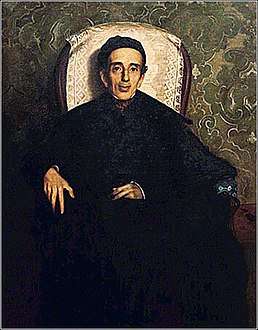Felipe Pardo y Aliaga
Felipe Pardo y Aliaga (11 June 1806, Lima – 24 December 1868, Lima) was a Peruvian poet, satirist, playwright, lawyer and politician.[1]

Portrait by Francisco Laso
Biography
A member of Lima's aristocratic elite, his father was Manuel Pardo Ribadeneira, oidor of Real Audiencia de Lima, and his mother was Mariana de Aliaga y Borda, daughter of 2nd Marquise of Fuente Hermosa.
He was, along with Manuel Ascencio Segura, the most important representative of early Republican Peruvian literature. After independence he participated in political affairs, defending conservative causes. He became a diplomat and a minister in the cabinet of presidents Felipe Santiago Salaverry, Manuel Ignacio de Vivanco and Ramón Castilla.
Pardo married Petronila de Lavalle y Cabero, daughter of 2nd Count of Premio Real. He was father of Manuel Pardo and grandfather of José Pardo y Barreda, presidents of the Republic.
Works
Essays and travelogues
- Un viaje 1840 "El viaje del niño Goyito"[2]
Poetry
- El carnaval de Lima, 1929
- La jeta del guerrero, 1925
- La nariz
- Los paraísos de Sempronio
- El ministro y el aspirante
- A mi levita
- Qué guapos chicos
- Corrida de toros
- La lámpara, 1844
- A mi hijo en sus días, 1855
- Vaya una República, 1856
- El Perú, 1856
- Constitución política, 1859
Plays
- Frutos de la educación, 1830
- Una huérfana en Chorrillos, 1833
- Don Leocadio y el aniversario de Ayacucho, 1833
References
- Gálvez, Soledad (2011). Ihrie, Maureen; Oropesa, Salvador (eds.). World Literature in Spanish: An Encyclopedia. ABC-CLIO. p. 737. ISBN 978-0-313-33770-3.
- Culture and Customs of Peru César Ferreira, Eduardo Dargent-Chamot - 2003 - Page 114 "Republic appeared was the popular Nino Goyito (Master Goyito), the protagonist of Un viaje (A Voyage; 1840), by Felipe Pardo y Aliaga (1806- 1868)"